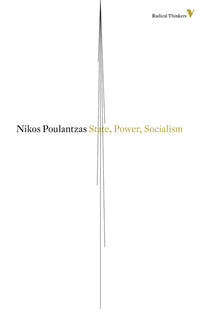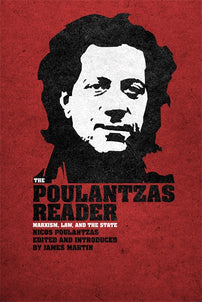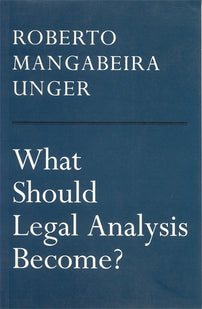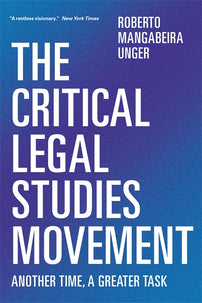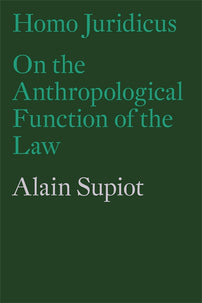Marxism and Public Law
Marxists should attend to the specific ways in which public law both conditions and is conditioned by social power and political activity.

First published in Legal Form.
The institutional forms of a capitalist state — its courts and prisons, its agencies or ministries, its regulatory apparatus and administrative procedures — are given articulation through law. Law — consisting of a particular array of relations that are necessary parts of “the social process of production” 1 — develops historically in a mutually constitutive relationship with the state. It is not simply a blackletter shadow cast by formations of social power or a textual description of the contours of state organs. Nor does it consist simply of imperative utterances freighted with authority and backed by overt coercion. Legal relations are intertwined with the other relations that are constitutive of a social totality. Social power, in turn, shapes and transforms legal processes and institutions.
Marxist legal theory has not always closely attended to these intersections between law and politics. The persistence of this lacuna can be traced, in part, to a lingering habit of regarding law as secondary or even irrelevant to critical social inquiry: “Marxist analyses of law often remain burdened by the legacy of reading Marx’s writings on capitalist development through the reductionist lens of the base-superstructure model, in which law is characterized as epiphenomenal and an ideological patina of material social relations.” 2
Law is co-productive with ideology, and it plays an important role in mystifying or naturalizing capitalist social relations. But it is more than mere mystification or ideological obfuscation. Law is better understood as an aspect of the totality of relations comprising a particular mode of production as it obtains in history. Indeed, property relations must necessarily appear in a given legal form: “[R]elations of production themselves take the form of particular juridical and political relations … which are not mere secondary reflexes … but constituents of these productive relations." 3 As such, the social and historical specificity of law is of profound interest in its own right.
Although there are important Marxist analyses of private law (most notably Pashukanis’ 4) that focus on the legal form as a constituent of the totality of social relations, such an approach is taken less frequently when it comes to issues of public law, such as administrative law, constitutional jurisprudence, and statutory interpretation. There is no shortage of non-Marxist legal scholarship that addresses relationships between law and politics in the context of questions of state legitimacy and the democratic authority of legislation. Little of it, however, is conducted in a genuinely critical register.
Rather than ceding this ground to liberal scholarship, Marxist students of law should contest it. There is, I would like to suggest, a need for a specifically Marxist examination of the uses to which legal concepts are put by liberal scholars in the pursuit of the legitimation of capitalist social relations (and, consequently, legitimating particular regimes of accumulation and exploitation). The interpenetration of law and politics at the level of public law is in urgent need of explicitly Marxist theorizing and investigation.
There are, of course, several examples in the Marxist tradition of describing the tropes and concepts of bourgeois constitutionality as part and parcel of a pattern of hegemony. Perry Anderson’s adumbration of Gramsci on this point — on how the institutions of representative democracy help to secure the illusion of consent under the cloak of hegemony — is perhaps the most illuminating. Anderson is surely right to emphasize how liberal theories of political legitimacy deploy the concept of popular sovereignty as a means of “reflect[ing] the fictive unity of the nation back to the masses as if it were their own government." 5 Yet there is little in this kind of account that must necessarily be considered distinctively legal or jurisprudential. (By “legal” here I mean something like Poulantzas’s description of capitalist law as an “axiomatic system” of general/formal norms embedded in a particular socio-institutional substrate — a system that instantiates a particular subjectivity, that of individual “juridico-political subjects-persons." 6)
Marxists should attend to the specific ways in which public law both conditions and is conditioned by social power and political activity. To assert that law is an epiphenomenal shadow cast by the social consequences of political conflict is to risk denying that law and politics stand in a dialectical relation. Law is capable of shaping political conflict, or frustrating it. To the extent that some instances of public law, particularly constitutional law, are seen by many political actors as forms of pre-political or “higher” law, we should not simply dismiss them as scrims of mystification drawn over the operation of social relations. The interpenetration of law and politics does not reduce to the concatenation of social relations and ideology, unless our conception of ideology is to be so capacious as to gain little analytic purchase in encounters with empirically observed social phenomena. A fuller understanding of public law’s internal contradictions is possible only if we take seriously (and critically!) its claims to autonomy as a particular kind of social rationality.
The legality of constitutional forms furnishes them with the appearance of mass consent to capitalist social relations within a given jurisdiction. Moreover, constitutional law (particularly in countries with constitutional courts with extensive powers, such as the US, Israel, Canada, Germany, etc.) tends to acquire its own justificatory logic over and against formally democratic institutions.
As an example, consider the role of popular sovereignty (the abstract ideal of popular sovereignty, that is, not the concrete and determinate mass activity comprising constituent power). Arguments in favor of the containment of democratic political processes within constitutional boundaries (and the institutions and norms that police them) frequently invoke specific claims about constitutional authority: to wit, that the sovereign people are the ultimate author of the constitutional design, and that to reproduce its structure is to carry out their will. The apparent concretization of the popular sovereign’s putative constitutive activity in legal-institutional forms is something that possesses its own considerable normative weight in a constitutional democracy.
This is not something that can or ought to be explained simply in terms of ideology or hegemony. A Marxist account of constitutional law must highlight the ways in which the invocation of popular sovereignty is so often looked to as the ground of synthesis in the face of the contradictions of constitutionalism, such as when constitutional courts invalidate laws enacted by legislatures.
Hopefully, a deeper Marxist analysis of the relations and contradictions that inhere in constitutionalism, judicial review, and other aspects of public law will not only be theoretically productive but also generate new lines of thought for social criticism and political strategy.
Notes
1. Jairus Banaji, Theory as History: Essays on Modes of Production and Exploitation (Leiden: Brill, 2010), 60.
2. Marc W. Steinberg, “Marx, Formal Subsumption and the Law”, Theory and Society 39 (2010): 174.
3. Ellen Meiksins Wood, Democracy Against Capitalism: Renewing Historical Materialism (Cambridge: Cambridge University Press, 1995), 27 (emphasis in original).
4. Evgeny Pashukanis, “The General Theory of Law and Marxism”, in Piers Beirne and Robert Sharlet (eds.), Pashukanis: Selected Writings on Marxism and Law (London: Academic Press, 1980), 32–131; also available at https://www.marxists.org/archive/pashukanis/1924/law/.
5. Perry Anderson, “The Antinomies of Antonio Gramsci”, New Left ReviewI/100 (1976): 28.
6. Nicos Poulantzas, State, Power, Socialism (London: Verso, 2014), 86–87.
Rob Hunter is a writer living in Washington, DC. He has previously written for the Guardian and Jacobin.
[book-strip index="1" style="display"]

